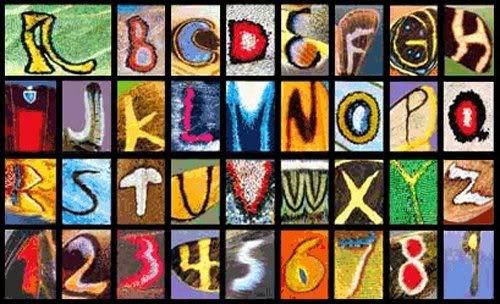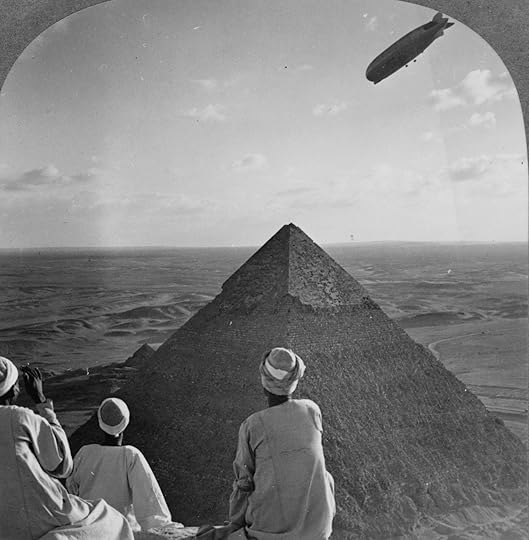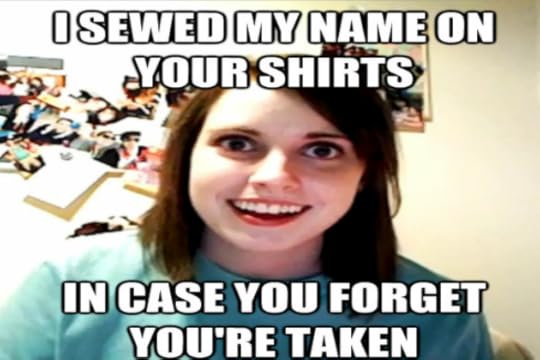S.B. Stewart-Laing's Blog, page 20
May 13, 2013
Dialogue: The Good Parts Version
 Everyone has heard that it's important for dialogue to sound natural. Under most circumstances, you don't want your characters to sound as though they're reading from a book. They should also sound like individuals, not simply an extension of the author's prose voice.
Everyone has heard that it's important for dialogue to sound natural. Under most circumstances, you don't want your characters to sound as though they're reading from a book. They should also sound like individuals, not simply an extension of the author's prose voice.That said, dialogue is a refined version of how people speak in real life. First of all, we use, like, a lot of filler words. You know what I mean, right? In real life, we barely notice this filler, since we are focused on absorbing the content in real time. Reading, however, is slower, and we will not only notice filler words that appear at the same rate they do in real life, but be annoyed with them. As a corollary, excessive swearing in dialogue quickly becomes this-- meaningless 'white noise' words the reader has to skim through to get the meaning of the speech itself.
Second, we say a lot of inane stuff. Psychologists refer to our social natter as 'keeping the channel open'-- using chitchat about the weather or other light topics to show our interest in the other person and keep the atmosphere generally friendly. While this is pleasant in real life, it's boring to read and slows the pace of your story to a crawl. Ideally, any small talk which seems necessary to the setting can be either summarised or used as a vehicle for some other conflict-- perhaps an assassin is trying to make casual banter while keeping an eye out for their target, or two people are engaged in flirting or passive-aggressive jabs for power.
Dialogue should be the 'good parts' of conversation, moving information and creating conflict where it's essential to the story.
Published on May 13, 2013 01:53
May 10, 2013
The 'Apple Pie and Motherhood' Problem
Speculative fiction, by its very nature, challenges our ideas about how the world works. These fictional universes which don't play by our real-life rules can be fundamentally uncomfortable places. Perhaps because of this, there can be a tendency-- particularly in fantasy-- to revert to socially conservative messages. Author Greg Egan called this the 'Motherhood Statement', a scenario in which a story:
Another part may be the author themselves losing their nerve. Having written a story requires posits unconventional ethics or an uncomfortable resolution, they panic and force a more 'acceptable' conclusion on the narrative, even if it doesn't jive with the story's universe.
And there we go: the problem with the Motherhood Statement is that it undermines the defining feature of speculative fiction-- that these stories confront us with a world where the assumptions we make in our everyday life are no longer valid. You need to let your 'what-if' world stand on its own, and that means letting the characters resolve their problems in a way that makes sense in that universe, not what makes sense in ours.
'posits some profoundly unsettling threat to the human condition, explores the implications briefly, then hastily retreats to affirm the conventional social and humanistic pieties, ie apple pie and motherhood.'Part of this may be driven by a commercial viability issue. People simply fear that introducing an unusual theme or perspective they will scupper the marketability of their story. However, I think that's a risk well worth taking, especially in the speculative fiction genres. Furthermore, as I've pointed out before, if it exists, someone will be horribly offended by it. No exceptions.
Another part may be the author themselves losing their nerve. Having written a story requires posits unconventional ethics or an uncomfortable resolution, they panic and force a more 'acceptable' conclusion on the narrative, even if it doesn't jive with the story's universe.
And there we go: the problem with the Motherhood Statement is that it undermines the defining feature of speculative fiction-- that these stories confront us with a world where the assumptions we make in our everyday life are no longer valid. You need to let your 'what-if' world stand on its own, and that means letting the characters resolve their problems in a way that makes sense in that universe, not what makes sense in ours.
Published on May 10, 2013 01:55
May 8, 2013
Beyond the Leonard Skynard Shirt: Speculative Fiction and Metaphor
I'm a fan of the original Star Trek series, and not because of Captain Kirk's shirtless fistfights or the so-bad-they're-good special effects. It's because the show 'got' that speculative fiction, much like comedy, is a wonderful tool for exploring social and ethical issues in a non-threatening way.
When I say non-threatening, I mean that giving issues a new context strips away the emotional immediacy that occurs when directly discussing real life. Because our real-life perspective is so personal, we are inclined to haggle over minute-- I'm not a racist, I just like Leonard Skynard! Once we have stepped outside of our lived experiences and away from the historical and cultural baggage, we can see more clearly what the core of the conflict is. Discussing a distant and hypothetical problem in a distant and hypothetical context gives people a 'safe space' to explore their own ideas about the situation and debate with others*.
Finally, it breaks us out of our route responses. We all have issues about which our reaction is almost a reflex. Read any online article on any controversial topic and you'll see what I mean-- on any given topic, you can see a virtually cloned argument in the comments section, rehashing a variety of points that may have nothing to do with what the author actually said. Speculative fiction takes away our ability to revert to our mindless, scripted responses and forces us to think if the story makes us uncomfortable or brings up an ethical dilemma.
Fiction has a wonderful way of getting people to think, even if it's superficially silly. I'd encourage you to develop that aspect of your speculative fiction and create a truly thought-provoking story.
*To the Forgotten Gods reader who thought Sir Roger had a point-- go directly to jail, do not pass go. Ditto the person who thought there was nothing wrong with Alfred's initial viewpoint, and was disappointed by his subsequent character development.
When I say non-threatening, I mean that giving issues a new context strips away the emotional immediacy that occurs when directly discussing real life. Because our real-life perspective is so personal, we are inclined to haggle over minute-- I'm not a racist, I just like Leonard Skynard! Once we have stepped outside of our lived experiences and away from the historical and cultural baggage, we can see more clearly what the core of the conflict is. Discussing a distant and hypothetical problem in a distant and hypothetical context gives people a 'safe space' to explore their own ideas about the situation and debate with others*.
Finally, it breaks us out of our route responses. We all have issues about which our reaction is almost a reflex. Read any online article on any controversial topic and you'll see what I mean-- on any given topic, you can see a virtually cloned argument in the comments section, rehashing a variety of points that may have nothing to do with what the author actually said. Speculative fiction takes away our ability to revert to our mindless, scripted responses and forces us to think if the story makes us uncomfortable or brings up an ethical dilemma.
Fiction has a wonderful way of getting people to think, even if it's superficially silly. I'd encourage you to develop that aspect of your speculative fiction and create a truly thought-provoking story.
*To the Forgotten Gods reader who thought Sir Roger had a point-- go directly to jail, do not pass go. Ditto the person who thought there was nothing wrong with Alfred's initial viewpoint, and was disappointed by his subsequent character development.
Published on May 08, 2013 02:29
May 6, 2013
Character Jobs
 I've written before about the tendency to give characters either 'cool' jobs, or an ambiguous job that doesn't interfere with the plot, or some combination of the two. I've also said before that I dislike the the fact that so many characters in Fictionland (and even more so in Fantasyland) look down on both manual labour and on 'cube farm' office jobs. All manual labourers are dumb and have no desire to get out of Dull Rural Fantasy Town #1,250, while all office workers are repressed, boring, and hate what they do. Unfortunately, there seems to be a very small number of jobs in Fantasyland which authors deem acceptably interesting, which contributes to the problem of rehashing the same overused plots.
I've written before about the tendency to give characters either 'cool' jobs, or an ambiguous job that doesn't interfere with the plot, or some combination of the two. I've also said before that I dislike the the fact that so many characters in Fictionland (and even more so in Fantasyland) look down on both manual labour and on 'cube farm' office jobs. All manual labourers are dumb and have no desire to get out of Dull Rural Fantasy Town #1,250, while all office workers are repressed, boring, and hate what they do. Unfortunately, there seems to be a very small number of jobs in Fantasyland which authors deem acceptably interesting, which contributes to the problem of rehashing the same overused plots.As someone who is strongly identified with my 9-5 office job*, I'd like to see a bit more diversity. There's plenty of interesting stories that could be hatched by authors willing to think outside the paranormal investigator box. Think about what jobs make your fantasy world run. Are their specialty grocery stores which cater to creatures which go bump in the night? Are there marriage counselors who deal with all the interspecies marriages which inevitably go belly-up? If a werewolf gets hit by a bus, do they need a paramedic who is familiar with their particular anatomy and physiology**? Do community colleges offer associates degrees in communicating with poltergeists? Can you get a PhD in alien languages? Do dragon trainers post fliers at the local vet, offering their services to people whose cart-pulling wyrvens keep eating the neighbourhood sheep? Do teachers need special training to deal with the offspring of the aforementioned human/non-human pairings who show up in their classrooms? Are there lawyers and lobbyists who deal with inter-species rights issues? All of those people could have absurdly interesting jobs in a sci-fi or fantasy universe and provide you with more than enough plot whilst they're stuck at the office.
Alternately, someone could have (*gasp*) an entirely 'normal' job which influences their interactions with the rest of the characters and plot. Perhaps the main plot occurs at their 'off the books' work or in their personal life, but there's no reason that their day job as a bus driver or telemarketer or physics teacher can't influence the plot.
*I'm a data scientist. We are awesomesauce.
**Like most greyhound owners, I had to shop for a 'greyhound-savvy' vet for Jack, as the breed has unusual enough blood chemistry and drug sensitivities to cause flusterment in non-specialised vets; surely the physiological differences between a were-creature and a human is greater than that between a greyhound and a bulldog.
Published on May 06, 2013 07:27
May 3, 2013
I See Dead Gay Love Interests
'By now the pattern was clear. Characters of questionable sexuality would meet with a nasty end in the last reel.'
-- The Celluloid Closet
During last month's blogfest, I was picking which trope to do for the letter B, and came down to 'Burger Fool' vs 'Bury Your Gays'. I decided that I hadn't written about classism in Fantasyland for a while. Besides, the Dead Gay Couple was an outdated trope, right?
Blog post written, I settled down to watch the BBC mini-series In The Flesh. The first episode was fantastic-- great premise, great characters, great acting, and lots of tantalising subplots. And then the ending happened. As it turns out, reports of the aforementioned obnoxious trope's death were greatly exaggerated. I will refrain from ranting about specifics, or this post will expand to novel length; instead, I'd like to take the opportunity to rant about the offending trope.
Just as I've said that evil should be an equal-opportunity employer, I think that any given character should-- in theory-- be vulnerable to death by dramatic necessity regardless of race, gender, orientation, etc. The key words here being 'dramatic necessity' (and also, as the author, you should have the ability for some meta-cognition about death tropes that have acquired unpleasant baggage and subtly avoid them).
So this is more than 'the gay guy dies'. The identifying features of this trope are one or more of the following:
The LGBT characters and/or their love interests get killed off in numbers disproportionate to their overall population in the story; Random disasters (alien attacks, hurricanes, meteor strikes, witchcraft-induced movement of the moon) seem to have a laser-guided ability to take out queer people without seriously damaging any named heterosexuals in the vicinity; The deaths are pointless and do not occur out of dramatic necessity;The death is a plot point as far as it occurs to cause angst to the surviving queer partner (much like the Disposable Woman), but this doomed character is not developed and/or serves no further dramatic purpose; Queer characters in happy relationships get their romantic partners squashed by the hand of the author fate while characters in opposite-sex pairings get to have a happily-ever-after;If a villain killed the queer character, they go unpunished, or only get punished for events peripheral to the queer character's death. I add a few of those caveats because some authors just have it in for happy couples, and will squish them like bugs regardless of orientation; Joss Wheadon is a prominent example. Similarly, if the story ends with a total party kill, the queer casualties probably don't have any more significance than the dead straight folks.
Also, I'd like to draw attention to the fact that I said 'angst' instead of 'motivation' when discussing the 'disposable' love interest. The surviving party cries and gayngsts and maybe kills themselves, but does not go off on a revenge-fueled killing rampage against the baddies like the bereaved hetero heroes (if I'm incorrect, please leave your counterexamples in the comments!). Unlike the Disposable Woman manifestation, which at least operates under the guise of getting the plot rolling, this just makes the queer characters miserable.
Ultimately, that's what really pisses me off about this trope. It pushes aside good storytelling or credible causality to make sure the LGBT characters get punished for existing...in the author's fictional universe. It's the author going out of their way to make the point that queer people can't have nice things, even in universes populated by telepathic horses or reformed zombies or aliens.
-- The Celluloid Closet
During last month's blogfest, I was picking which trope to do for the letter B, and came down to 'Burger Fool' vs 'Bury Your Gays'. I decided that I hadn't written about classism in Fantasyland for a while. Besides, the Dead Gay Couple was an outdated trope, right?
Blog post written, I settled down to watch the BBC mini-series In The Flesh. The first episode was fantastic-- great premise, great characters, great acting, and lots of tantalising subplots. And then the ending happened. As it turns out, reports of the aforementioned obnoxious trope's death were greatly exaggerated. I will refrain from ranting about specifics, or this post will expand to novel length; instead, I'd like to take the opportunity to rant about the offending trope.
Just as I've said that evil should be an equal-opportunity employer, I think that any given character should-- in theory-- be vulnerable to death by dramatic necessity regardless of race, gender, orientation, etc. The key words here being 'dramatic necessity' (and also, as the author, you should have the ability for some meta-cognition about death tropes that have acquired unpleasant baggage and subtly avoid them).
So this is more than 'the gay guy dies'. The identifying features of this trope are one or more of the following:
The LGBT characters and/or their love interests get killed off in numbers disproportionate to their overall population in the story; Random disasters (alien attacks, hurricanes, meteor strikes, witchcraft-induced movement of the moon) seem to have a laser-guided ability to take out queer people without seriously damaging any named heterosexuals in the vicinity; The deaths are pointless and do not occur out of dramatic necessity;The death is a plot point as far as it occurs to cause angst to the surviving queer partner (much like the Disposable Woman), but this doomed character is not developed and/or serves no further dramatic purpose; Queer characters in happy relationships get their romantic partners squashed by the hand of the author fate while characters in opposite-sex pairings get to have a happily-ever-after;If a villain killed the queer character, they go unpunished, or only get punished for events peripheral to the queer character's death. I add a few of those caveats because some authors just have it in for happy couples, and will squish them like bugs regardless of orientation; Joss Wheadon is a prominent example. Similarly, if the story ends with a total party kill, the queer casualties probably don't have any more significance than the dead straight folks.
Also, I'd like to draw attention to the fact that I said 'angst' instead of 'motivation' when discussing the 'disposable' love interest. The surviving party cries and gayngsts and maybe kills themselves, but does not go off on a revenge-fueled killing rampage against the baddies like the bereaved hetero heroes (if I'm incorrect, please leave your counterexamples in the comments!). Unlike the Disposable Woman manifestation, which at least operates under the guise of getting the plot rolling, this just makes the queer characters miserable.
Ultimately, that's what really pisses me off about this trope. It pushes aside good storytelling or credible causality to make sure the LGBT characters get punished for existing...in the author's fictional universe. It's the author going out of their way to make the point that queer people can't have nice things, even in universes populated by telepathic horses or reformed zombies or aliens.
Published on May 03, 2013 02:02
May 1, 2013
Consistent Characterisation, Part II: Growth and Change
 In real life, we are constantly learning and adapting to the world around us. Fictional characters do the same-- faced with life-changing conflict, they modify their behaviours, their views, and their self-image. So how to we reconcile the necessity of character growth and change with the fixed nature of basic personality I talked about on Monday?
In real life, we are constantly learning and adapting to the world around us. Fictional characters do the same-- faced with life-changing conflict, they modify their behaviours, their views, and their self-image. So how to we reconcile the necessity of character growth and change with the fixed nature of basic personality I talked about on Monday?A large part of this is making the nature and direction of the character's change be consistent with their core personality. No two characters should react to the a situation the same way, and if the change in a character's outlook or behaviour is consistent with their focal personality traits, it will make sense.
Also, remember that the character doesn't need a complete overhaul. Growth can be subtle and gradual, and may be centred on one aspect of their lives. Assuming they don't sustain major chemical or physical damage to their brains, they should still be fundamentally the same person they were at the start.
Published on May 01, 2013 02:22
April 29, 2013
Consistent Characterisation, Part I: We Know Who You Are
 I harp a lot on internal consistency as a key part of worldbuilding, particularly in speculative fiction, where we're asking readers to accept things like secret government-approved alien invasions or faster-than-light travel or evil unicorns or secret wizard schools. If these things obey their own set of rules and logic, we are willing to accept the impossible as a part of that setting, and sit back and enjoy the story. But equally important is applying that same internal logic and consistency to character development.
I harp a lot on internal consistency as a key part of worldbuilding, particularly in speculative fiction, where we're asking readers to accept things like secret government-approved alien invasions or faster-than-light travel or evil unicorns or secret wizard schools. If these things obey their own set of rules and logic, we are willing to accept the impossible as a part of that setting, and sit back and enjoy the story. But equally important is applying that same internal logic and consistency to character development.In real life, barring brain damage, neurological illness, or severe psychological trauma, the basic characteristics of our personalities are essentially permanent by about the age of three. Some traits are set while we're still fetuses. Although we can change how we manage our outward presentation, underlying personality traits-- such as someones's level of introversion or extroversion-- won't change. This needs to be true of your characters as well if they're to present as believable. For example, if a character is the melodramatic type who treats their every life event as Serious Business, it snaps the reader out of the story to see an unexplained episode of nonchalance or stoicism from the character (looking at you, Walter Scott!).
Of course, a character may hold forth a persona which does not reflect their true personality. However, since we can be in the character's head, we know this is a front, and can see their real self accordingly. Furthermore, we know the circumstances which caused them to create this self-presentation, and can see the interaction between those conditions and the character's true colours. Again, the key here is to build a consistent, coherent set of personality traits for the character which underpin their actions even if those traits aren't always on display.
Published on April 29, 2013 01:23
April 27, 2013
End of April

Hope everyone enjoyed April A to Z! It's been fun to discover new blogs and bloggers and have an excuse to dig through TVTropes.
Thanks to all of you who commented on my posts-- I love hearing reader thoughts.
We will return to our regularly scheduled programming on Monday.
Published on April 27, 2013 04:24
April 26, 2013
Zeppelins from Another World
 When Michael and I were in the planning stages of Forgotten Gods, and discussing various alternate history and historical fantasy books, we jokingly decided that our unique selling point was that we were writing an alternate history which didn't feature zeppelins.
When Michael and I were in the planning stages of Forgotten Gods, and discussing various alternate history and historical fantasy books, we jokingly decided that our unique selling point was that we were writing an alternate history which didn't feature zeppelins.For some reason, zeppelins have become asignature feature of alternate history or alternate universes which show similarity to earth. This may be partially related to the popularity of steampunk or a steampunk-inspired aesthetic in the genre. (Often, the period between the 1870s and 1920s seems to be the default for historical fantasy and various alternate histories.) But zeppelins have popped up in fictional universes with a diverse range of technological development levels.
I don't have a peeve with this trope so much as a general curiosity. First of all, while zeppelins certainly have some good features, there are certainly incentives for various alternate worlds to develop a variety of transport technology, including other kinds of flight. This is particularly true if they have a number of other
 high-tech tools. So while there's an aesthetic appeal, it doesn't always feel congruent with the fictional world.
high-tech tools. So while there's an aesthetic appeal, it doesn't always feel congruent with the fictional world.Also, I wonder if authors think that focusing on the time period I mentioned is an integral part of the alternate history and historical fantasy genres, much the way that a psudo-medieval setting has become the norm in fantasy (and considered by many beginning authors to be a genre requirement for epic fantasy).
I'd encourage you to stop imitating existing authors in your chosen spec-fic subgenre, no matter how much you enjoy your work. Explore a time period or a place no one writes about. Think about a new divergent timeline. Create something that's uniquely yours. There's an infinite universe of possibilities out there, and only a small fraction of them require a zeppelin.
Published on April 26, 2013 01:58
April 25, 2013
Yandere
 Everyone goes a bit loopy when they fall in love-- it's simple brain chemistry. Then there's this character, termed a 'yandere' by manga and anime fandom*, who takes 'crazy about you' to a whole new level. Done right, these characters can be genuinely scary antagonists or plot complications. Done unintentionally, this comes off as creepy at best and condoning abusive behaviour at worst.
Everyone goes a bit loopy when they fall in love-- it's simple brain chemistry. Then there's this character, termed a 'yandere' by manga and anime fandom*, who takes 'crazy about you' to a whole new level. Done right, these characters can be genuinely scary antagonists or plot complications. Done unintentionally, this comes off as creepy at best and condoning abusive behaviour at worst.This is a character whose core identity revolves around being in love with the object of their affections. Without this person, they have no other defining interests, personality, or will to live or influence the plot. It's very easy to turn this character into an incredibly creepy and persistent antagonist.
The main trap writers fall into when writing these characters is to portray their disturbed behaviour as cute or romantic. In real life, most people would be all kinds of freaked out if someone bullied them into dates by dangling off tall buildings or watched them sleep through the window or tried to control their social life by breaking their car. In Fictionland, authors often seem to give such behaviour a pass because they know the stalker is a good person who's just gone a little love-crazy. There's no reason fictional characters should put up with interpersonal nonsense that real people wouldn't in the same situation. So if you're trying to think of a romantic gesture, think about how you'd respond if a suitor pulled that on you-- if you'd call the cops, tone it down.
*A portmanteau of the Japanese words for 'troublemaking' and 'lovesick'
Published on April 25, 2013 01:49



